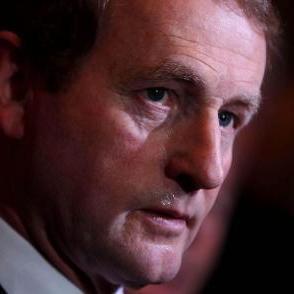We need leadership, but where are the leaders?

Cowen and Kenny are liabilities, not just to their parties, but to the country, writes Vincent Browne.
The Irish people have no confidence in the present Taoiseach, Brian Cowen, and they have no confidence in the alternative taoiseach, Enda Kenny.
This is at a time when, because of our dysfunctional political culture, leadership matters.
Neither of their respective parties seems in the least bit perturbed that, at this time of crisis, the country is denied a leader in whom they might have confidence.
Leadership matters now because of the need to win support for the difficult adjustments that need to be made to get the state out of the current mess.
Yet neither of the two main parties is willing to confront the glaring reality that the country does not want either Cowen or Kenny.
Of those who have an opinion in the matter, nearly 90 per cent are dissatisfied with the performance of the government, according to last week's TV3 poll.
Is this unique for a government anywhere in what are called democracies?
Of those who have an opinion, nearly 80 per cent are dissatisfied with the performance of the leader of the government.
Only 11 per cent want him as the next taoiseach, and more than half of those intending to vote Fianna Fáil next time out don't want him. Of those who have an opinion, 67 per cent are dissatisfied with the performance of the alternative taoiseach, Enda Kenny.
Only 19 per cent want Kenny to be the next taoiseach, and barely half of the supporters of his own party want him.
More than half of his party's supporters are dissatisfied with his performance.
At a time when support for the party of government, Fianna Fáil, has collapsed, the alternative party of government, Fine Gael finds its position almost static. (It won 27.3 per cent in the 2007 election, and the TV3 poll shows the party at 30 per cent, which is within the 3 per cent margin of error.)
That says something about its leader.
It doesn't matter whether the public is wrong about the capabilities of Cowen or Kenny: the public don't want them. Cowen and Kenny are liabilities, not just to their parties, but to the country.
If the soldiers of the rearguard can't bring themselves to topple their general, it is a certainty that there will be far fewer soldiers of the rearguard than would otherwise be the case.
The prospect is that, without a change of leadership, there will be further seepage of the Fianna Fáil vote - it could be down to 18 per cent (from the 22 per cent registered in theTV3 poll and the 24 per cent in today's Sunday Business Post/Red C poll).
The party is likely to lose 30 seats in the next election (it won 78 seats in 2007).
A whole raft of Fianna Fáil TDs will be gone, most of them forever.
If they do nothing at all when their own self-interest is at stake, how can we expect them to do anything when merely the national interest is at stake?
As for Fine Gael, is everyone in the party dense, be calmed or indifferent - or a mixture of all of these? If any or all of these, is there any reason to think it would be better than the present hapless lot?
Or is it just self-interest -Fine Gael TDs don't want to cause trouble, as it would be bad for their prospects - and to hell with the national interest?
What does that say about them?
There is close to zero chance of Labour being the largest party after the next election and, therefore, of Eamon Gilmore being taoiseach.
The best that Labour could do would be to win 45 seats, which would be a huge achievement for Gilmore (the party won 20 seats in 2007 and, in the ''Spring tide'' of 1992, it won just 33 seats).
Go through the constituencies one by one, and see how Labour could possibly get more than 45 seats. Realistically, it will be fewer than that. So, folks, it is Enda or Brian, and, if you don't like it -and the majority don't - too bad.
That's democracy for you. By the way, I don't like this ''leader'' thing - although, right now, given the apathy of the electorate, it has relevance.
The idea of democracy is that people are self-governing, not governed by someone else. Ideally, we should all be in this together, no one leading, no one following anyone else.
All partaking in decision-making - especially in the decisions that vitally affect society and its future.
But we have built a system whereby the sovereignty of the people is subcontracted to a political class which, in turn, subcontracts it to a governing elite.
The people have only the most indirect say in how they are governed and, as a result, they lose interest in governing and in politics.
Can that be democracy? Because we have a passive, disfranchised electorate, leaders matter. A pity we don't have any.
